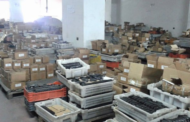Kenya has further consolidated its status as the gateway to East Africa and a leading trade hub in the region. The country tops the list of highest exporting countries in the 19-member COMESA trading bloc, emerging as the top performer in the regional East African market
.
In recent years, Kenya has also been labelled as a viable business hub in the East African region and many foreign companies have set up assembly plants in Kenya to penetrate the lucrative markets in the region. By manufacturing in Kenya, the businesses are able to transport their goods within COMESA member countries without paying taxes, thereby adding to their profit margins.
Several Asian manufacturers, predominantly from India and China, have established warehouses in Kenya where they send the semi-finished goods to, and then use EAC trade protocols to move them around East African countries like Tanzania, Uganda and Rwanda. In such a scenario, many local manufacturers have blamed the government for not devising appropriate policies to protect the local manufacturing sector from unfair competition.
Competition from overseas investors and businesses is forcing local businesses in Kenya to reduce their profit margins in order to stay competitive in the price-sensitive markets of East Africa. By offering better products and lower prices, these new businesses are challenging the monopoly of many well- established businesses in Kenya.
Last year, Kenya imported goods valued at $200 million and re-exported goods worth $520 million. Egypt came in second, exporting goods worth $490 million and importing from other COMESA member states goods valued at $180 million. Zambia ranked third, selling goods worth $300 million and re-exporting products valued at $100 million. It however, bought an equally higher amount worth $290 million.
Zimbabwe, the southern African country currently facing a major economic crisis, came fourth exporting goods worth $170 million and re-exporting $120 million worth of goods. It also imported semi and finished products from other member states valued at approximately $430 million.
The landlocked country of Uganda led in the category of countries with the highest imports, buying from other members states products worth $70 million, and is closely followed by Sudan, which imports goods worth $65 million.
The Democratic Republic of Congo, emerging from years of turmoil, came in third importing products worth $60 million, Zambia $30 million, followed by Ethiopia, which imported goods valued at $21 million.
Oil exporting economies have been witnessing the highest growth, with Sudan’s economy growing at approximately 11 per cent in 2012. Non-oil economies exporting mineral and metal commodities also witnessed strong growth.
As a result, Kenya has become a focus of attention for international businesses looking to penetrate the emerging markets of East Africa.




































